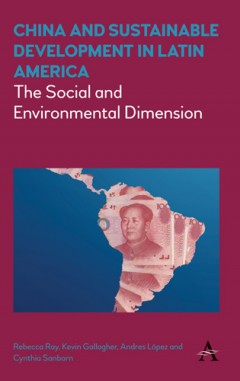China and Sustainable Development in Latin America
The Social and Environmental Dimension
Edited by Rebecca Ray
Kevin Gallagher
Andres López
Cynthia Sanborn
Anthem Frontiers of Global Political Economy and Development
- About This Book
- Reviews
- Author Information
- Series
- Table of Contents
- Links
- Podcasts
About This Book
During Latin America’s China-led commodity boom, governments turned a blind eye to the inherent flaws in the region’s economic policy. Now that the commodity boom is coming to an end, those flaws cannot be ignored. High on the list of shortcomings is the fact that Latin American governments—and Chinese investors—largely fell short of mitigating the social and environmental impact of commodity-led growth.
China and Sustainable Development in Latin America documents the social and environmental impact of the China-led commodity boom in the region. Primary commodity exploitation—of petroleum, copper, iron ore, tin, soybeans and the like—are endemic to environmental degradation. The recent commodity boom exacerbated pressure on the region’s waterways and forests and accentuated threats to human health, biodiversity, global climate change and local livelihoods. China and Sustainable Development in Latin America also highlights important areas of innovation, like Chile’s solar energy sector, in which governments, communities and investors have worked together to harness the commodity boom for the benefit of the people and the planet.
It is imperative that Latin American governments put in place the necessary policies to ensure that economic activity in natural resource sectors is managed in an environmentally responsible and socially inclusive manner. China and Sustainable Development in Latin America aims to highlight the efforts that have borne fruit as well as the areas that still need attention. Without proper policies in place to make sustainable development part and parcel of economic decision-making, Latin America will continue to be plagued by commodity boom and bust cycles that accentuate social and environmental conflicts and are ultimately detrimental to long-term prosperity.
Reviews
“This book is one of the most important and recent efforts to analyze the social and environmental impacts of the deepening relationship between China and the Latin American countries over the past few decades. The increasing volume of goods traded between the Asian giant and the region, the traces left by their extractive companies and the lessons learned from their investment projects along the continent, provide the current picture – and possible future path – of this growing bond.” –César Leonidas Gamboa Balbin, Professor, National University of San Marcos, Peru
“This work provides stakeholders on both sides of the world with much-needed analysis and data to start a conversation that can’t wait any longer: how are we going to address and prevent the unwanted environmental and social impacts of Chinese investments in Latin America?” –Paulina Garzón, Director, China-Latin America Sustainable Investments Initiative, USA
Author Information
Rebecca Ray is a research fellow at Boston University’s Global Economic Governance Initiative and a PhD student in economics at the University of Massachusetts Amherst.
Kevin Gallagher is Professor of Global Development Studies at Boston University’s Frederick S. Pardee School of Global Studies, and Co-director of BU's Global Economic Governance Initiative.
Andrés López is a full professor of development economics and head of the economics department at the University of Buenos Aires as well as the executive director of the Red Sudamericana de Economía Aplicada.
Cynthia Sanborn is Professor of Political Science and Vice President for Research at the Universidad del Pacifico.
Series
Anthem Frontiers of Global Political Economy and Development
Table of Contents
Part I. Introduction and Regional Overview ; 1.China in Latin America: Lessons for South-South Cooperation and Sustainable Development — Rebecca Ray, Kevin P. Gallagher, Andres Lopez, and Cynthia Sanborn; Part II. China and Latin America’s Hydrocarbons Sector; 2. FDI and Trade: is China Relevant for the Future of our Environment? The Case of Argentina — Julian Donaubauer, Andrés López, and Daniela Ramos; 3. Colombia and China: Social and Environmental Impact of Trade and Foreign Direct Investment — Guillermo Rudas Lleras and Mauricio Cabrera Leal; 4. A Line in the Equatorial Forests: Chinese Investment and the Environmental and Social Impacts of Extractive Industries in Ecuador — Rebecca Ray and Adam Chimienti; Part III. China and Latin America’s Mining Sector; 5. An Assessment of the Environmental and Social Impacts of Chinese Trade and FDI in Bolivia — Alejandra Saravia López and Adam Rua Quiroga; 6. Chinese Investment in Peru’s Mining Industry: Blessing or Curse? — Cynthia Sanborn and Victoria Chonn; Part IV. China and Latin America’s Agricultural Sector; 7. China’s Influence on Deforestation in Brazilian Amazonia: A Growing Force in the State of Mato Grosso — Philip M. Fearnside and Adriano M.R. Figueiredo; Part V. China and Latin America’s Manufacturing Sector; 8. Chinese Incidence on the Chilean Solar Power Sector — Nicola Borregaard, Annie Dufey, Maria Teresa Ruiz-Tagle, and Santiago Sinclair; 9. China in Mexico: Some Environmental and Employment Dimensions — Claudia Schatan and Diana Piloyan
Links
Stay Updated
Information
Latest Tweets



